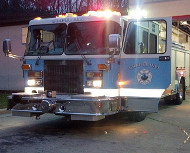Article from: www.thenewspaper.com/news/42/4201.asp
9/9/2013
North Carolina Court To Decide Whether Firemen Can Perform Traffic Stops
Court of Appeals in North Carolina orders a trial judge to decide whether it is legitimate for a fireman to use his firetruck to arrest a motorist.
 Can a firefighter pull over a motorist suspected of driving under the influence of alcohol? Perhaps not, a sharply divided North Carolina Court of Appeals ruled last Tuesday. Gordon Shatley, a Chapel Hill Fire Department lieutenant, was responding to a fire alarm when he stopped his fire engine at the intersection of Estes Drive and Fordham Boulevard at 10:30pm on May 27, 2011. To his left he saw a light-colored Mercedes stopped with a window partially rolled down in pouring rain with only parking lights and the interior dome light on. He found it odd.
Can a firefighter pull over a motorist suspected of driving under the influence of alcohol? Perhaps not, a sharply divided North Carolina Court of Appeals ruled last Tuesday. Gordon Shatley, a Chapel Hill Fire Department lieutenant, was responding to a fire alarm when he stopped his fire engine at the intersection of Estes Drive and Fordham Boulevard at 10:30pm on May 27, 2011. To his left he saw a light-colored Mercedes stopped with a window partially rolled down in pouring rain with only parking lights and the interior dome light on. He found it odd.
The light turned green and Shatley drove on to where he was dispatched, only to find another fire engine beat him to the scene. He turned back, and on his way to the station he saw the odd Mercedes driving 30 MPH in a 45 MPH zone. Shatley called the police and followed the vehicle which began weaving toward oncoming traffic. Shatley had the red flashing lights of the fire truck activated and the siren blasted twice. The Mercedes pulled over.
Shatley spoke to the Mercedes driver, Dorothy Hoogland Verkerk, saying he "just wanted to make sure she was okay." He asked her whether she would park and have someone else pick her up, but she drove off. Ten minutes later, Chapel Hill Police arrived and after speaking with Shatley, they caught up to Verkerk and pulled her over and charged her with drunk driving.
At trial, Orange County Superior Court Judge Elaine Bushfan denied Verkerk's motion to suppress the evidence that arose from the firefighter's traffic stop, arguing the stop had nothing to do with the Fourth Amendment because it was the equivalent of a lawful citizen's arrest. Verkerk was sentenced to thirty days in prison, 18 months of probation, 72 hours community service and a $1000 fine plus costs. On appeal, the judges found the stop did implicate the Fourth Amendment.
"As a result of the fact that defendant stopped her Mercedes following activation of the flashing lights and siren with which the fire engine that Lieutenant Shatley commanded was equipped, we have no hesitation in concluding that, assuming that the other exclusionary rule prerequisites exist, the stopping of the defendant's car constituted a 'seizure' for Fourth Amendment purposes and that the trial court erred by reaching a contrary conclusion," Judge Sam Ervin IV wrote for the Court of Appeals majority.
The panel majority, however, was not ready to let Verkerk go free based on the scanty record at hand and the lack of clear precedent for the case. It asked the lower court to determine whether Shatley was operating as a government agent or a private citizen.
"If, after hearing any additional evidence that it deems necessary and making the necessary finding, the trial court concludes that Lieutenant Shatley acted as a private citizen rather than as a governmental agent at the time that defendant's vehicle was stopped, then the trial court should deny defendant's suppression motion and reinstate the trial court's judgment," Judge Ervin wrote.
On the other hand, the appellate panel ordered the lower court to give Verkerk a new trial if the suppression motion is upheld.
A copy of the decision is available in a 200k PDF file at the source link below.
Source: North Carolina v. Verkerk (Court of Appeals, State of North Carolina, 9/3/2013)
Permanent Link for this item
Return to Front Page
 Can a firefighter pull over a motorist suspected of driving under the influence of alcohol? Perhaps not, a sharply divided North Carolina Court of Appeals ruled last Tuesday. Gordon Shatley, a Chapel Hill Fire Department lieutenant, was responding to a fire alarm when he stopped his fire engine at the intersection of Estes Drive and Fordham Boulevard at 10:30pm on May 27, 2011. To his left he saw a light-colored Mercedes stopped with a window partially rolled down in pouring rain with only parking lights and the interior dome light on. He found it odd.
Can a firefighter pull over a motorist suspected of driving under the influence of alcohol? Perhaps not, a sharply divided North Carolina Court of Appeals ruled last Tuesday. Gordon Shatley, a Chapel Hill Fire Department lieutenant, was responding to a fire alarm when he stopped his fire engine at the intersection of Estes Drive and Fordham Boulevard at 10:30pm on May 27, 2011. To his left he saw a light-colored Mercedes stopped with a window partially rolled down in pouring rain with only parking lights and the interior dome light on. He found it odd.